PTI moves SC seeking clarity on reserved seats days after NA speaker's letter to ECP

Pakistan
PTI Chairman Barrister Gohar moved the petition through Advocate Uzair Kramat
ISLAMABAD (Dunya News) - The Pakistan Tehreek-e-Insaf (PTI) on Saturday approached the Supreme Court seeking clarity on the issue of reserved seats.
PTI Chairman Barrister Gohar moved the petition through Advocate Uzair Kramat.
The petition was moved days after the speakers of National Assembly and Punjab Assembly wrote letters to Election Commission of Pakistan over the issue of reserved seats.
“The letters written by the speakers of National Assembly and Punjab Assembly would not affect the short order of July 12,” PTI chairman maintained in his petition.
Barrister Gohar said that the ECP should ignore the letters written by both the speakers.
“The ECP is bound to implement the July 12 order in the light of Supreme Court’s clarification order of September 14,” the petition said.
The PTI chairman said that the ECP must be barred to allocate the reserved seats to any other political party till the case is pending with the apex court.
It merits mention here that the National Assembly Speaker Sardar Ayaz Sadiq had written a letter to ECP demanding allocation of reserved seats to parties in the light of amended Election Act.
Also Read: SC verdict on reserved seats can't be implemented after amendment to Election Act: NA speaker
He mentioned that the Supreme Court's decision on reserved seats cannot be implemented after the amendment to the Election Act.
In the letter, Speaker Ayaz Sadiq told the chief election commissioner that reserved seats cannot be changed after the amendment to the Election Act.
He said that the Election Act is currently in effect, so the Election Commission should implement the law made by Parliament and adhere to the principles of democracy and parliamentary supremacy.
He wrote that an independent member who joins a political party cannot switch parties under the amended Election Act. The amended Election Act has been applied retroactively from 2017, and implementing it is the constitutional and legal responsibility of the Election Commission.


